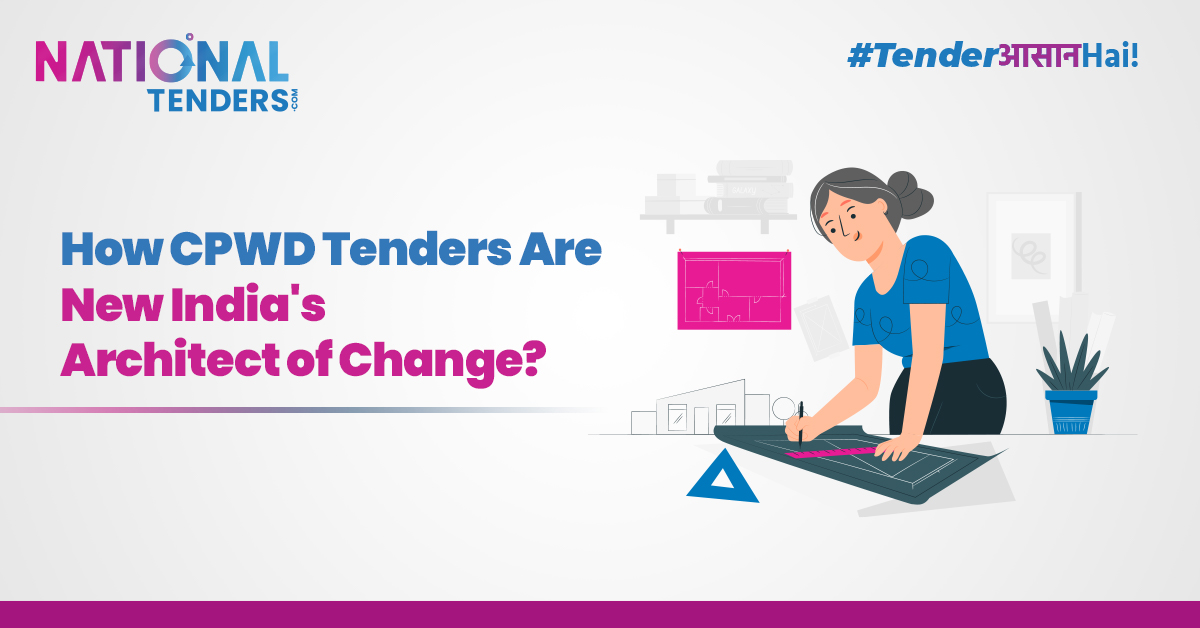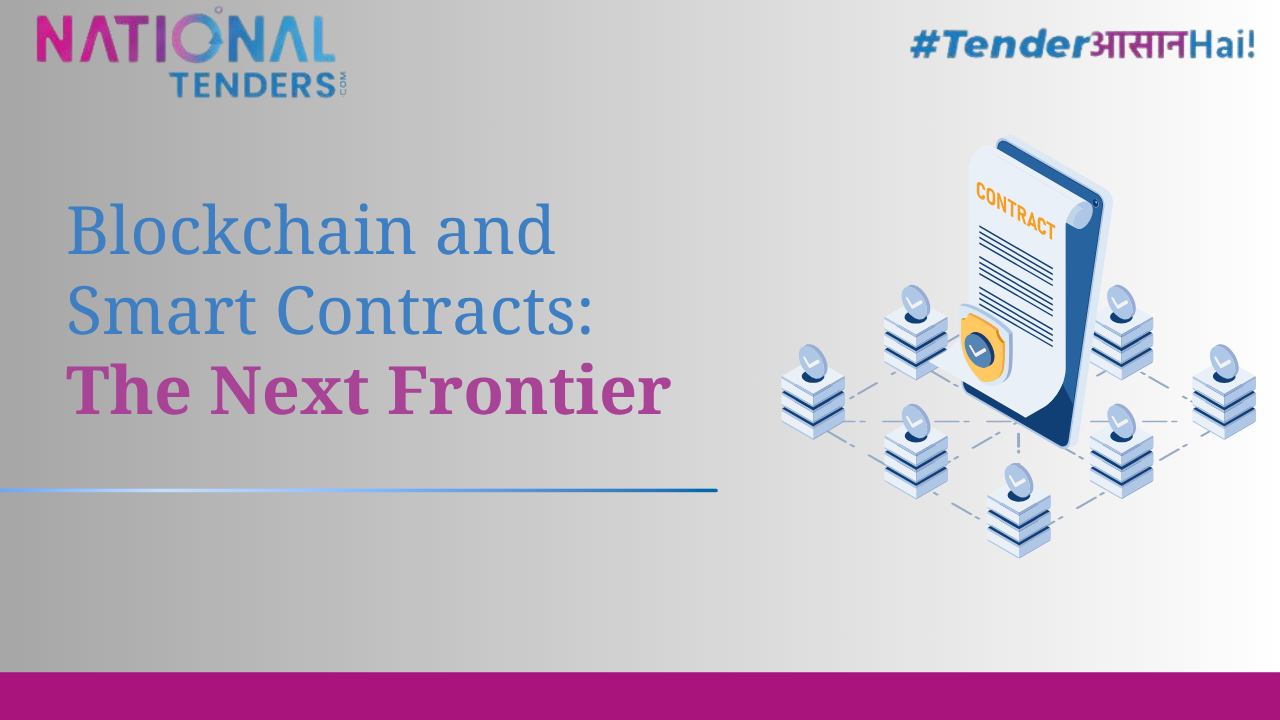- Home
- >
- Blog
OUR BLOG
A collection of stories about our people, our capabilities, our research, and the ever-changing face of our firm.

NationalTenders
How CPWD Tenders Are New India's Architect of Change? | 18 Oct, 2023
How CPWD Tenders Are New India's Architect of Change?
Introduction to CPWD Tenders
The introduction to CPWD Tenders is of utmost relevance for those engaged in the Indianconstruction sector. The Central Public Works Department (CPWD) is an esteemed authority under the Ministry of Housing and Urban Affairs, responsible for the execution of governmental construction projects. CPWD Tenders serve as the platform for various contractors and suppliers to participate in the procurement process for these projects. The tender results determine the selection of vendors for carrying out the designated works.
With the advancement in information technology, CPWD offers an online portal where interested parties can browse through the available tenders and submit their bids. This initiative by the Government of India ensures transparency and efficiency in the public procurement process, contributing to the growth and development of the construction sector.
Role of CPWD in India's Infrastructure Development
The CPWD plays a pivotal role in the development of India's infrastructure. As an eminent institute, CPWD is responsible for the construction and maintenance of various essential buildings and roads across the country. Under the jurisdiction of the central government, CPWD is entrusted with the task of ensuring the smooth functioning and upkeep of government buildings, including colonies, hostels, and offices. From West Bengal to Uttar Pradesh, from Assam to Gujarat, and even to the union territory of Puducherry, CPWD's
With its vast workforce and extensive network of offices and centres, CPWD efficiently carries out multiple projects to enhance India's infrastructure and provide quality maintenance services. It not only contributes significantly to the economic growth of the country but also aids in establishing a sense of cohesion and progress in both urban and rural areas. Thus, CPWD plays a crucial role in facilitating India's path towards sustainable development and modernization.
Understanding CPWD Tenders
To gain a comprehensive understanding of CPWD tenders, it is essential to delve into the intricacies of this procurement process. The CPWD is a government agency responsible for the construction and maintenance of public infrastructure in India. CPWD tenders encompass a wide range of projects, including the construction of office buildings, water supply systems, electrical installations, footpaths, and more. These tenders are conducted both at the state and central levels and are accessible to contractors and suppliers across
To stay updated with the latest CPWD tenders, interested parties must keep a close eye on the official websites of CPWD and the relevant state governments, such as the Delhi and Kolkata state tenders portals. CPWD has adopted an e-procurement system called e-Tenders, which effectively digitalizes the tendering process. This system enables online submissions of bids, online evaluation of proposals, and helps in maintaining transparency and fairness in the tendering process.
Familiarizing oneself with CPWD Civil Works Tenders and CPWD e-Tenders is crucial for those aiming to participate in public work projects and contribute to the development of the country's infrastructure. With a careful examination and understanding of CPWD tenders, potential bidders can navigate through the complexities of the process and make informed decisions.
Benefits of Participating in CPWD Tenders
Participating in CPWD (Central Public Works Department) tenders offers numerous benefits for businesses. CPWD tenders are accessible through the e-procurement system, known as e-tendering. This platform allows businesses to easily access a wide variety of tender information related to government construction projects. By participating in CPWD tenders, businesses can have the opportunity to secure lucrative contracts and expand their operations significantly.
CPWD tenders encompass a broad range of sectors, including mechanical, sewerage, and rainwater harvesting systems, as well as the construction of residential quarters for various categories of government employees. This variety of tenders enhances business opportunities for companies in these specific industries.
Furthermore, participating in CPWD tenders also provides businesses with a chance to work closely with the government. This collaboration not only strengthens their reputation but also provides them with valuable experience in managing government projects. Additionally, by participating in these tenders, businesses can showcase their capacity to deliver high-quality work, which can lead to increased credibility and future contracts.
Moreover, CPWD tenders ensure transparency and fairness in the selection process, promoting a competitive environment for businesses to submit their bids. This transparency eliminates any biases or favoritism and rewards businesses based on their capabilities and expertise in their respective fields.
In conclusion, participating in CPWD tenders through the e-procurement system presents businesses with a wide array of opportunities. It allows them to access timely tender information, expand their operations, collaborate with the government, and showcase their capabilities. Ultimately, this can lead to increased profitability and growth for businesses involved in government construction projects.
Eligibility and Pre-Qualification Criteria
The eligibility and pre-qualification criteria for CPWD tenders are subject to variation based on the project's nature and estimated cost. The use of e tender and e procurement methods is common in CPWD, ensuring transparency and efficiency in the tendering process. Emphasizing external collaboration, CPWD focuses on enabling effective participation by qualified vendors and contractors in the tendering activities.
Some of the common eligibility criteria include:
Registration with the CPWD
To register with the CPWD, interested parties must complete the formal application process. This includes submitting all relevant documents and information required by the CPWD. Once the application is reviewed, and if all criteria are met, individuals or organizations will be added to the CPWD's register or panel. This registration allows for future participation in CPWD projects and grants access to necessary resources and opportunities within the industry.
Minimum net worth required for CPWD tender
The CPWD has a priority to ensure fair and transparent procurement processes in order to maintain the highest standards in government tendering. To participate in CPWD Building Maintenance Tenders, interested parties must adhere to certain criteria, including a minimum net worth requirement. This benchmark ensures that only financially stable entities are considered for such contracts. Interested parties can obtain further details and submit their bids through the eprocurement platform provided by the CPWD.
Satisfactory completion of similar works in the past set a good impression for business while bidding for CPWD Tenders
The successful fulfillment of comparable projects in the past plays a pivotal role in establishing a positive reputation when vying for CPWD tenders. By showcasing past achievements and experiences in executing similar works, companies can instill confidence in the selection committee. A history of collaborating with esteemed institutions like the Indian Institute, renowned for its proficiency and credibility, further reinforces the bidder's capability and reliability.
The pre-qualification criteria set by CPWD are highly specific and are tailored to evaluate the contractor's capability in effectively accomplishing the assigned project. These criteria are meticulously designed to ensure that only the most qualified contractors are selected. By analyzing factors, CPWD aims to ascertain the contractor's suitability for the project. This thorough evaluation process enables CPWD to distribute projects to contractors who possess the required skills and resources for successful project completion.
These criteria may include the following:
- Experience in similar projects
- Financial capacity
- Technical expertise
- Equipment and facilities
- Manpower
- Health, safety, and environmental (HSE) compliance
Preparing a Winning Bid for CPWD Tenders
- Carefully read the tender document
- Assess your eligibility
- Gather all the required information
- Prepare a realistic bid
- Highlight your strengths
- Be prepared to negotiate
- Submit your bid on time
Contract Execution and Project Implementation
- Signing the contract: Once the tender has been awarded, the contractor and the CPWD will sign a contract. The contract will set out the terms and conditions of the project, including the scope of work, the estimated cost, the payment terms, and the dispute resolution mechanism.
- Mobilizing resources: The contractor will need to mobilize the necessary resources to start the project. This includes hiring staff, procuring materials, and obtaining permits.
- Executing the work: The contractor will then execute the work in accordance with the contract. This includes carrying out the construction, making payments to suppliers and subcontractors, and managing the project site.
- Monitoring and controlling the project: The contractor will need to monitor and control the project to ensure that it is completed on time, within budget, and to the required quality standards. This includes regular progress meetings, inspections, and reports.
- Handover of the project: Once the project is complete, the contractor will need to hand it over to the CPWD. This includes providing a final report, completing all outstanding work, and clearing the project site.
 How E-Tendering is Transforming the Tender System in India
How E-Tendering is Transforming the Tender System in India Building Strong Vendor Partnerships in the Tender Ecosystem
Building Strong Vendor Partnerships in the Tender Ecosystem Unlocking Big Savings Through Smart Tender Strategies
Unlocking Big Savings Through Smart Tender Strategies How Generative AI Is Disrupting Tendering in 2025
How Generative AI Is Disrupting Tendering in 2025 Blockchain and Smart Contracts: The Next Frontier in Public Procurement
Blockchain and Smart Contracts: The Next Frontier in Public Procurement
SUBSCRIBE NOW
Kindly fill up the form